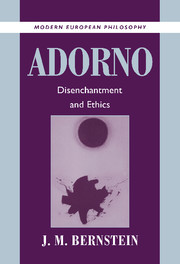Book contents
- Frontmatter
- Contents
- Preface
- List of Abbreviations
- Introduction
- 1 “Wrong Life Cannot Be Lived Rightly”
- 2 Disenchantment: The Skepticism of Enlightened Reason
- 3 The Instrumentality of Moral Reason
- 4 Mastered by Nature: Abstraction, Independence, and the Simple Concept
- 5 Interlude: Three Versions of Modernity
- 6 Disenchanting Identity: The Complex Concept
- 7 Toward an Ethic of Nonidentity
- 8 “After Auschwitz”
- 9 Ethical Modernism
- Index
8 - “After Auschwitz”
Published online by Cambridge University Press: 05 June 2012
- Frontmatter
- Contents
- Preface
- List of Abbreviations
- Introduction
- 1 “Wrong Life Cannot Be Lived Rightly”
- 2 Disenchantment: The Skepticism of Enlightened Reason
- 3 The Instrumentality of Moral Reason
- 4 Mastered by Nature: Abstraction, Independence, and the Simple Concept
- 5 Interlude: Three Versions of Modernity
- 6 Disenchanting Identity: The Complex Concept
- 7 Toward an Ethic of Nonidentity
- 8 “After Auschwitz”
- 9 Ethical Modernism
- Index
Summary
Introduction
“Meditations on Metaphysics,” in which Adorno's most famous discussion of Auschwitz takes place, is the third of three models that make up the final part of Negative Dialectics; the other two models being “Freedom: On the Metacritique of Practical Reason” and “World Spirit and Natural History: An Excursion to Hegel.” Models, themselves composed of aphoristic fragments, are another of the forms of writing Adorno identifies as a critical successor to the system. The term itself is appropriated from Schöenberg. Adorno describes models in The Philosophy of Modern Music thusly:
Now, in association with development, variation serves in the establishment of universal, concretely unschematic relationships. Variation becomes dynamic. It is true that it still strongly maintains the identity of its initial thematic material – what Schöenberg calls its “model.” Everything remains “the same.” But the meaning of this identity reveals itself as nonidentity. The initial thematic material is so arranged that preserving it is tantamount to transforming it. There is in fact a way in which it no longer exists “in itself,” but only with a view towards the possibility of the whole composition.
This description makes models sound akin to Hegelian Aufhebung, sublation as canceling and preserving since here too an original concept is shown to be “dynamically” or internally related to what originally appears as heterogeneous to it. So, again, Kant's notion of freedom is shown to require the very somatic and causal moment it is originally designed to escape.
- Type
- Chapter
- Information
- AdornoDisenchantment and Ethics, pp. 371 - 414Publisher: Cambridge University PressPrint publication year: 2001
- 1
- Cited by



